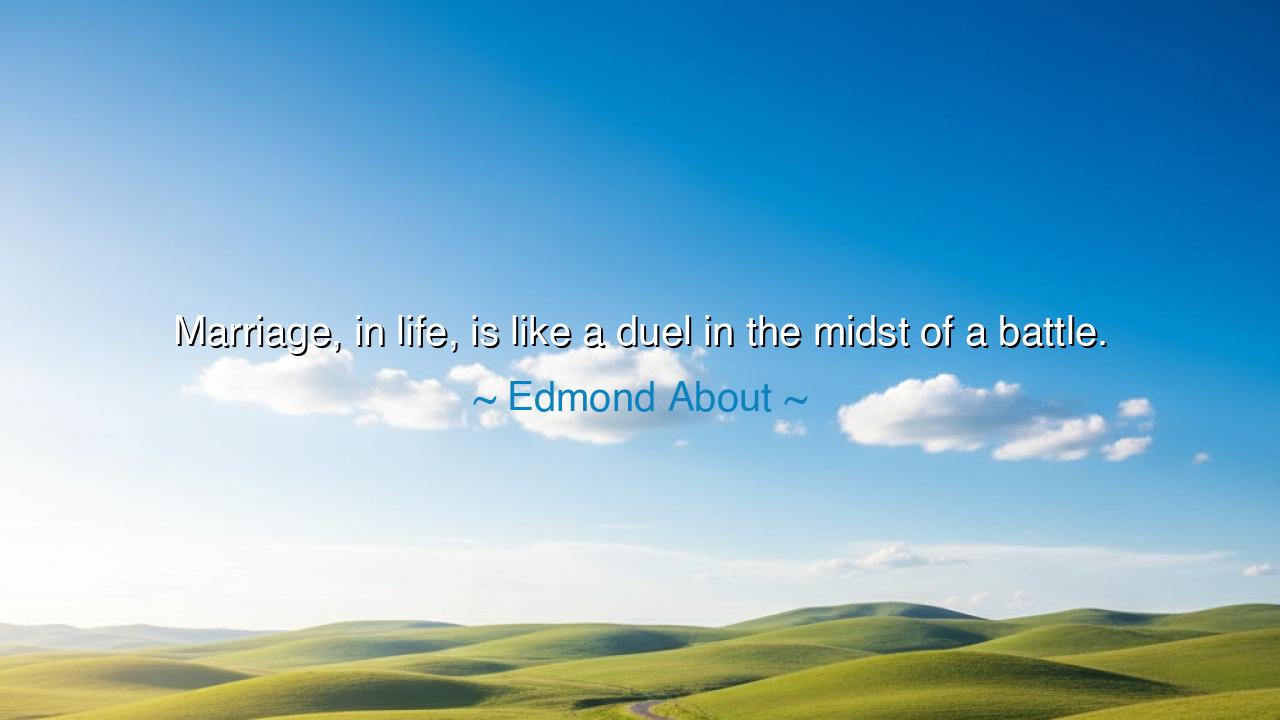
Marriage, in life, is like a duel in the midst of a battle.






Hear the fierce words of Edmond About, who likened love’s most sacred bond to strife and trial: “Marriage, in life, is like a duel in the midst of a battle.” At first hearing, this saying shocks the heart, for marriage is often sung as harmony, union, and bliss. Yet in his wisdom, About unveils the hidden struggle: that to bind one’s life to another is not to escape the battle of existence, but to enter a contest within it, where two souls, even in love, must wrestle with each other while the world rages around them.
The meaning of this saying is deep. Life itself is a battle—against poverty, against fate, against sorrow, against the countless trials that besiege every mortal. Yet in the midst of these struggles, the married are not spared from further conflict. For in marriage, two wills, two dreams, two tempers meet, and at times they clash. Like warriors locked in a duel, husband and wife must contend with each other’s flaws, fears, and desires. It is no easy thing to keep peace while the storms of the world beat upon the walls of home. Thus, marriage is not a retreat from the battlefield, but a duel fought within its very heart.
The origin of this thought lies in the realism of human nature. Edmond About, a French writer of the 19th century, lived in a society where marriage was both exalted and burdened with duty. He saw how husbands and wives, though bound by vows, often contended fiercely, their love mixed with strife. His metaphor strips away illusions, warning that marriage is not a perpetual feast of tenderness but a crucible where iron sharpens iron. In this duel, the aim is not to destroy one another, but to endure, to refine, and to emerge stronger together amidst the chaos of the wider battle.
History offers examples that echo his words. Consider Abigail and John Adams, whose letters across the storms of revolution show both devotion and contention. John, laboring to forge a new nation, and Abigail, managing home and children, often quarreled in words, yet never lost their bond. Their marriage was indeed a duel, sharp with disagreements, but it unfolded amidst the greater battle of America’s birth. In the end, their love endured precisely because they accepted the struggle and grew within it.
Yet About’s words, though harsh, are not despairing. For what is a duel, if not a test of courage and skill? What is a battle, if not the crucible that reveals strength? Marriage, like the duel, demands vigilance, patience, and mastery over self. To fight fairly, to learn humility in defeat, and to extend mercy after conflict—these are the arts of survival in wedlock. And when both partners learn them, the duel becomes not destruction but growth, and the marriage becomes a union tempered like steel in fire.
The lesson, then, is clear: do not enter marriage with illusions of endless peace. Know that you will contend, not only with the world, but with each other. Yet see these struggles not as doom, but as opportunity. Each quarrel can teach patience, each hardship can deepen trust, each clash of wills can carve the path toward greater understanding. To endure in marriage is not to avoid strife, but to embrace it with love as the guiding weapon, so that the duel strengthens rather than destroys.
So, children of tomorrow, take this teaching to heart. When you marry, do not seek a life without battles, for such a life does not exist. Instead, choose the one with whom you can fight fairly, love fiercely, and forgive endlessly. Accept the duel within the battle, and let it shape you into stronger, wiser, and more faithful souls. For in this crucible lies not despair, but the deepest kind of victory: a marriage that endures, scarred by conflict yet bound by unbreakable love.






AAdministratorAdministrator
Welcome, honored guests. Please leave a comment, we will respond soon